August 7th, 2021: Greetings from Hualien. Hope everyone is enjoying the summer in mixed pandemic conditions across the globe. Things are starting to open up again here in Taiwan as they have cases under 10 again (which is pretty impressive!) and are rolling out vaccines quickly as well, going with a first doses first policy.
Today’s post is by Lauren Razavi, a fellow nomad, remote worker, and all-around curious human. I talked to her a few weeks ago about her book, which details the past, present, and future of digital nomadism. I’m pretty excited about it and think the way she’s exploring this trend is a unique lens of looking at the broader shifts in work underway.
If you are stumbling upon Boundless from the web, come join 4,500+ people for weekly reflections on finding work worth doing,
#1 The Rise of The Digital Nomad
Before remote work became the status quo, a small group of early adopters spent years experimenting with its potential in the background. They became known as digital nomads. I was, and continue to be, one of them.
I started remote working straight out of college. I’ve built freedom, fun, and flexibility into the way I live, work and play since the first day of my career. I’ve lived in six places each year, visiting more than 40 countries over the last eight. I’ve worked as a travel writer, foreign reporter, ghostwriter, tech editor and, at one point, even founded a startup (RIP).
For me, location is, and always has been, fluid and flexible rather than fixed. That's probably because of my family background. My experience of love and life has never been restricted to just one place, so I saw no reason work should be either.
I grew up in two countries and across three cultures. My dad was a refugee from Iran to the U.K. in the 1980s. He's the youngest of eight children now spread across the world as part of the Iranian diaspora. Growing up, vacations took us around the world to visit family. There, we'd stay in pockets of Iran inside apartment buildings or suburban houses in Hamburg, London, Connecticut, and other cities. I learned to build relationships with my cousins across borders and cultures.
When the Covid-19 pandemic hit, I'd just quit my remote job as a tech editor with a vague plan to "go independent." I ended up launching a newsletter about borderless living and writing a book about digital nomads. These projects have provided unique insights into the cultural shifts of the past 18 months. Not only in terms of work, but in terms of life and politics too. Today, I want to share some thoughts on what comes next for the nomad movement.
The Remote Work Boom
In March 2020, the world entered its largest-ever experiment with remote work. A year later, McKinsey predicted that 25% of workers in advanced economies would work remotely going forward, and 10% in emerging economies. The mainstream conversation may still be stuck on the "return to the office" narrative, but the dynamics of work have changed for good. In the context of remote work, timezone matters more than proximity to the office. For many tasks, timezone doesn't matter much either.
When decisions about work and location are separate, individuals hold more power than ever before. We're entering an era where the fundamentals of a person's life are determined by what they want, not what their employer wants.
What Is a Digital Nomad?
Pieter Levels, founder of Nomad List and an influential voice in the nomad community, predicts there'll be a billion digital nomads by the year 2035. That's equivalent to 12% of the global population today.
Before diving into the implications of this potential shift, let's set out a definition of the term "digital nomad" (borrowed from my upcoming book, Global Natives):
"A digital nomad is a remote working person who lives away from their homebase for at least part of the year."
People often think digital nomads are constantly in motion, moving to new locations every week or two. In reality, most nomads stay somewhere as much time as their visa allows and will keep returning to the destinations they like the best. The most important feature of the nomad mindset is not the pace of their travel but their flexible attitude towards the location.
A Global Network of Knowledge Hubs
The earliest "nomad capitals" already exist, optimized for the remote economy through fast WiFi speeds, affordable short-stay rentals, and coworking spaces. The remote work community is so strong in hubs like Bali and Chiang Mai, people visit for the nomad counterculture almost as often as they do for the tourist sites.
When I was living in the Balinese town of Ubud, I kept bumping into people I’d met halfway across the world – the same way you might run into a neighbor at the local coffee shop. Some nomads migrate around the world in groups, hopping from one place to another when the season changes, and knowing they’ll see the same faces in their next destination.
Slowly, a global network of destinations is forming – knowledge hubs that attract remote workers from all over the world, just as the hippie trail once attracted artists from all over the world. Around the world, ambitious policymakers are hoping to take advantage.
The Battle for Remote Talent
Big tech companies have normalized borderless hiring over recent decades. When they need particular skills, they seek out knowledge workers and relocate them from wherever they are. Those same companies were the first to offer remote work options before Covid-19, which helped the nomad movement grow in the 2010s. Now, though, it's not just companies battling for knowledge workers, but governments too.
In June 2020, Barbados made history by announcing it would launch the world's first nomad visa. More than 20 such visa programs have emerged since then. Greece and Italy have gone a step further, offering generous tax reductions for nomads who base there. Some regions in the U.S. are so keen to attract remote talent that they're offering cash incentives of up to $15k for incoming residents.
Enjoying this post? Sign up for Lauren’s Counterflows newsletter about borderless living:
Digital Nomads as a Reverse Diaspora
The term "reverse diaspora" originates with investor and technologist Balaji S. Srinivasan. It refers to a community that forms on the internet, builds a culture online, then comes together in person. These communities, he says, are the foundations of a new phenomenon called "internet countries." So, what happens if we apply this idea to digital nomads?
The movement first came about when people started using the internet to share info on visa laws, cheap flights, air pollution, and places to stay, via forums, blogs, and social media. Early adopters experimented in the real world, then shared back the results. The movement swelled: Seeing people take off and work from anywhere encouraged others to experiment.
Nomads definitely came together as a community on the internet and built their own culture online. Just look at the growth of the r/DigitalNomad community on Reddit – from 43 members in 2012 to more than 1.1 million members in 2021:
This decade, the community is maturing. In a handful of places, nomads are moving offline with nomad villages, coliving communities, and coworking spaces. Right now, I live full-time in a micro-apartment at Zoku Amsterdam, a remote work hotel that’s like a nomad neighborhood in a building. It’s not just remote work that’s going mainstream, but a whole new way of living.
Nomads are also beginning to organize politically for the first time. The Plumia project aims to create the global infrastructure for borderless living, away from traditional nations, and democratize the ability for people to move freely around the world. We want to see people's global mobility rights protected by default, not just treated as a privilege for those with powerful passports or extreme wealth.
The Fight for Global Mobility Rights
Beginning in the 1980s, the ultra-wealthy could access global mobility via "citizenship by investment" programs, i.e., buying a new passport that grants seamless movement across borders. Now, a new global middle class of knowledge workers is gaining access to mobility rights through nomad visas. Yet millions of people are still excluded from participating: those from low passport power countries, refugees, the displaced, and the stateless. Why? Because they were audacious enough to be born in the wrong country.
Mobility restrictions produce fundamental inequalities that are difficult to justify in a world of remote work. Trade, capital, knowledge, and communication flow freely across borders – yet human beings still face restrictions. The internet enables us to work from anywhere, but until we fix the bugs in the systems governing global movement, we'll fail to unlock the potential of that shift. Digital nomads represent a new way of seeing and navigating the world – one that lets individuals share in the fruits of globalization.
Pre-order Lauren’s book Global Natives – the next 50 copies are half-price!
#2 Accidental Freelancer To 10+ Year Solopreneur
Austin Church thought he was going to be a poet. When that didn't go as planned, he joined the business world. Six months later he was laid off in the 2008 recession. Luckily, his firm hired him back as a freelancer and that completely changed his perspective on work. Ever since he's been hacking a living, shifting roles as a freelancer, founder, entrepreneur, and coach.
🎧 Anchor | YouTube | Google | Spotify
150, wild…
In 2017 I remember sitting at my computer fine-tuning an e-mail in Mailchimp. I was putting the final touches on an update about my freelance journey. Ok, I was really terrified of sending out an e-mail to people. It felt invasive. “Who am I to be sharing what I think?” I think it was less than 100 people on the list.
If you had told me that four years later I’d be in an ongoing conversation with incredibly kind, curious, and open-hearted humans from around the world based on a newsletter I send to 4,500 people, I don’t think I would have believed you.
But here we are. I’m still having a ton of fun doing this newsletter and experimenting with different ways of sharing ideas, working with other writers, and figuring out what the hell is going on with work and how things will shake out this decade.
If you’d like to support the journey you can do so by becoming a paid supporter, purchase my freelance consulting course or strategy consulting skills course or if you are operating in the online creator space, use one of the programs I recommend:
Podia - 14-day free trial
Teachable - 14-day free trial
ConvertKit - First 1k subscribers for free


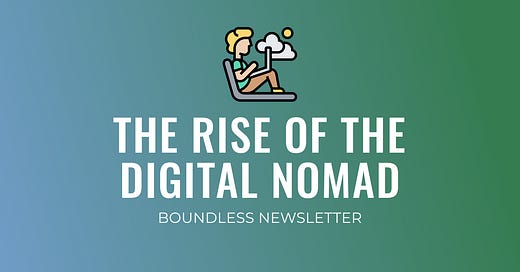


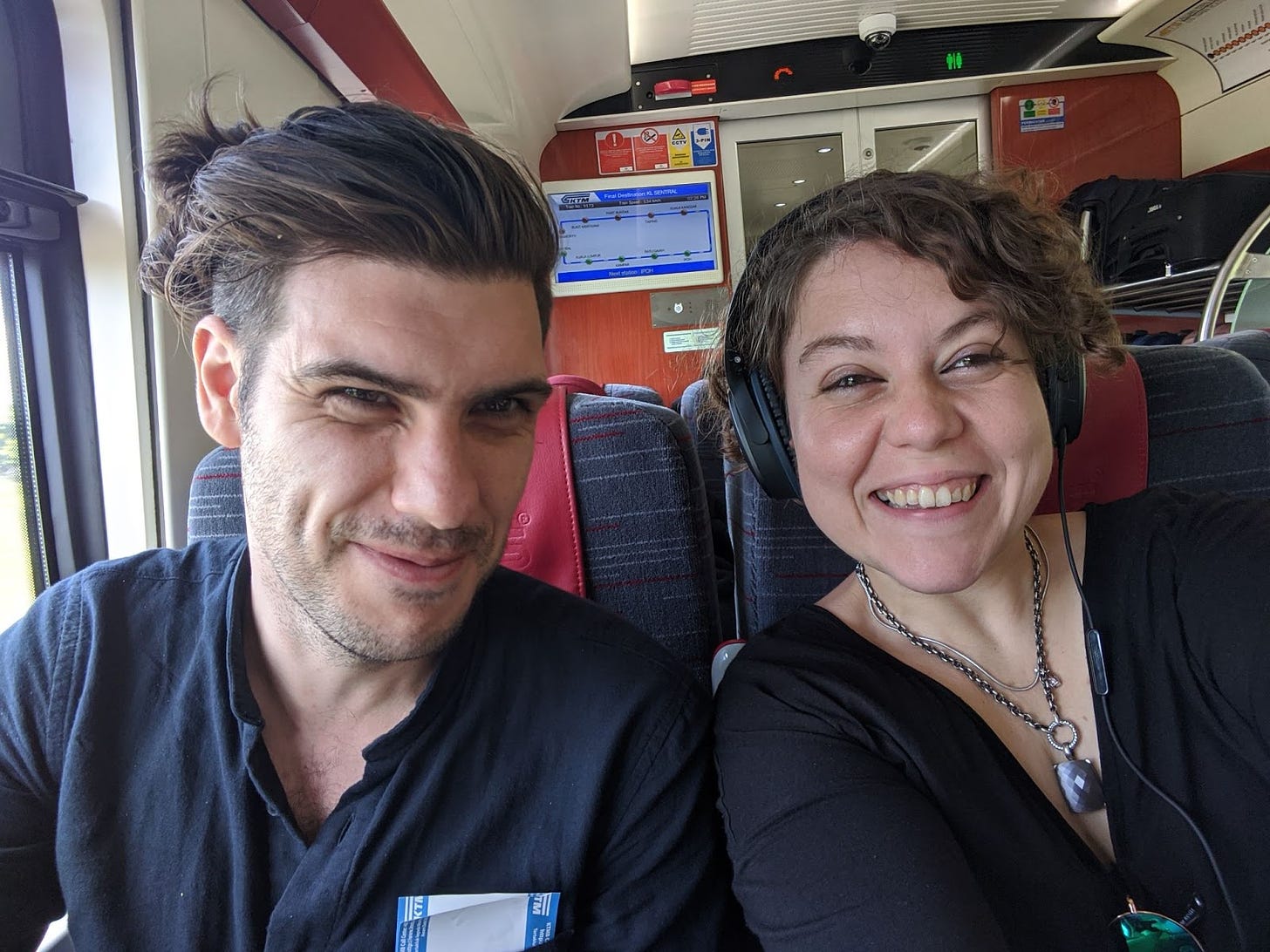
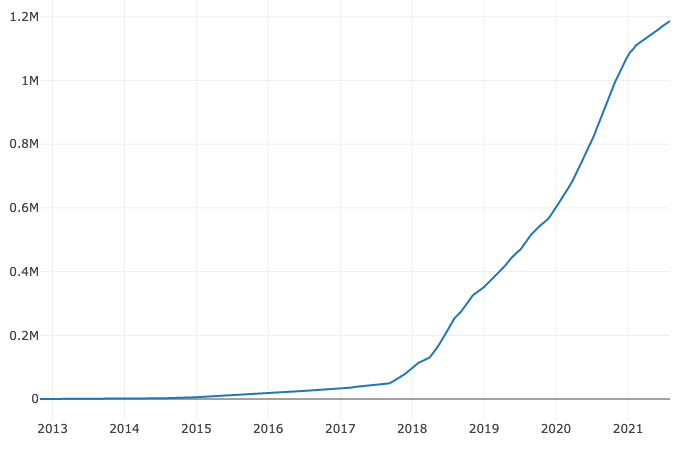
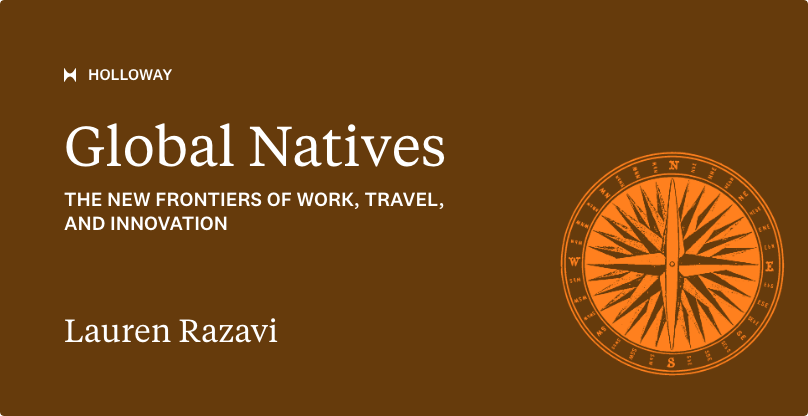

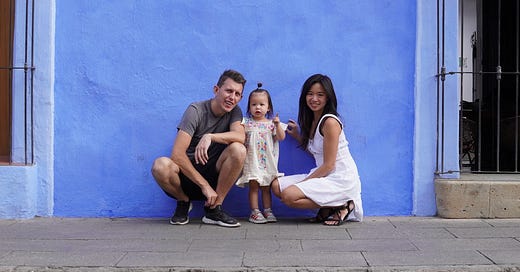





Nomading can be exhausting though: having to figure out where to shop for groceries and necessities and dentists in every location, no integration with the local community, no investment in a place or its future. It attempts to take meatspace and turn it into a disposable, consumable commodity.
There needs to be a distinction made between true nomadism and just living in a 2-3 countries at a time.